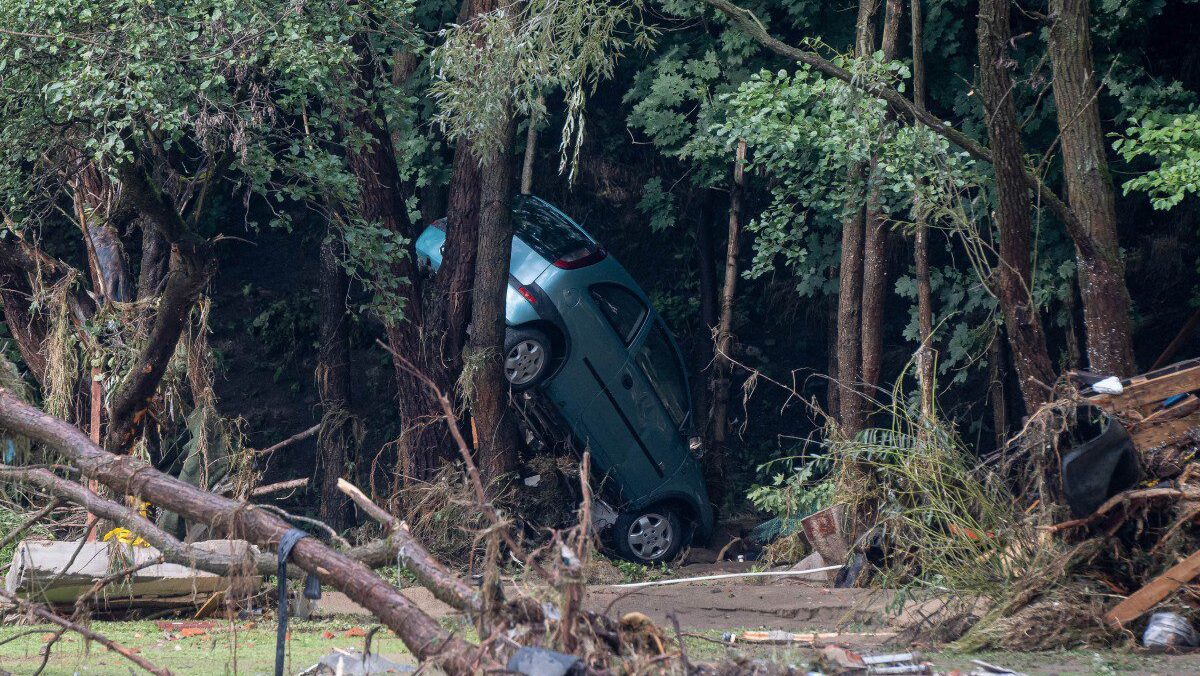
This photograph taken on September 16, 2024 shows a car wedged between trees following the floods in Ladek-Zdroj, southern Poland.
Photo: Mateusz SLODKOWSKI / AFP
Floods sparked by Storm Boris are wreaking havoc in Central Europe as high winds and heavy rainfall have hit parts of Austria, the Czech Republic, Hungary, Poland, Romania, and Slovakia in the past few days.
So far, the storm has caused the deaths of seven people in Romania, four in Poland, four in Austria, and three in the Czech Republic.
Many have compared the current situation to the 2013 floods which primarily affected Central Europe and caused the deaths of 25 people.
Parts of Austria have been hit by five times the average amount of rain they get for the entire month of September. The flooding has broken twelve dams, with muddy rivers raging, while thousands of households were without electricity and water in Lower Austria. Hundreds of people have been evacuated by helicopter from car roofs and other places.
Visuals from Vienna, Austria, is also concerning.
— Mr. Shaz (@Wh_So_Serious) September 15, 2024
Part of one of the districts has been evacuated. #Vienna #Austria #AustriaFloods#Floods #Flooding #Rain #HeavyRain#Österreich #ÖsterreichÜberschwemmungen #Überschwemmungen #Regen #Starkregen
pic.twitter.com/rsdF8fHVZs
The floods prompted Austrian political parties to cancel or postpone election events. “There is now a pause in the election campaign! We must devote all our energy and attention to disaster management and helping those affected by the storms,” Chancellor Karl Nehammer posted on social media platform X.
In eastern Germany, mobile flood protection walls were set up in some areas to protect Dresden’s old city as the Elbe river level rose, with the peak expected mid-week.
In Poland, thousands of people had to be evacuated from their homes as the government declared a state of natural disaster. Prime Minister Donald Tusk announced one billion zloty (€235 million) in aid for those hit by the storm. Warsaw has asked the European Union to provide funds for the damages.
Kłodzko. Poziom wody sięga już czubka latarni ulicznej. #powodź2024 #Powodź #dolnośląskie #DolnyŚlask #Kłodzko pic.twitter.com/jUbbMaZX25
— Jakub Rosiński (@Jakub__Rosinski) September 15, 2024
The head of President Andrzej Duda’s National Security Bureau declared that “it is time for Brussels to show its solidarity, as we have done many times in floods, fires and disasters in the EU.”
Border areas between the Czech Republic and Poland were hit hard over the weekend. Heavy rain that has fallen since last week, along with surging water levels, collapsed some bridges, forced evacuations, and damaged cars and houses.
Schools and offices in the affected areas were closed on Monday and drinking water and food were being delivered by trucks.
Polish authorities have filled 75% of a giant reservoir near the Czech border, aimed at cutting water levels and preventing flooding waves on the Odra and Nysa from overlapping.
Czech Prime Minister Petr Fiala said more than 13,000 people had been evacuated. Tens of thousands of Czech and Polish households were still without power.
The Czech Republic has been hit by its worst floods in nearly three decades after rivers burst their banks in heavy rains https://t.co/MFq177HOxC pic.twitter.com/AwKqKkQIUi
— Reuters (@Reuters) September 16, 2024
Despite the dire situation, the government announced on Monday that the regional elections will go ahead as planned on Friday and Saturday, September 20th and 21st.
Hungarian Interior Minister Sándor Pintér said efforts were focused on keeping the river and its tributaries within their banks and said up to 12,000 soldiers were on standby to help. The Danube is expected to reach its peak in Budapest at the end of this week. Hungarian Prime Minister Viktor Orbán said he would postpone all of his “international obligations,” including his appearance at the European Parliament, which was scheduled for Wednesday, September 18th.
